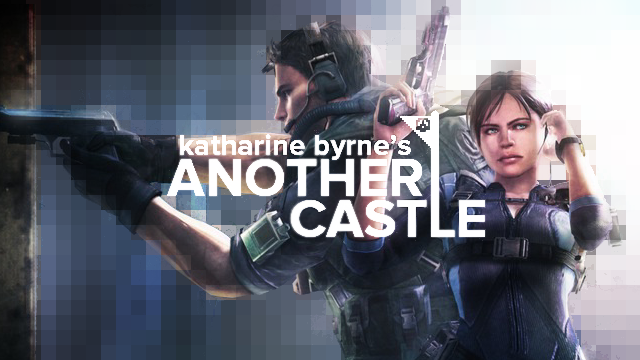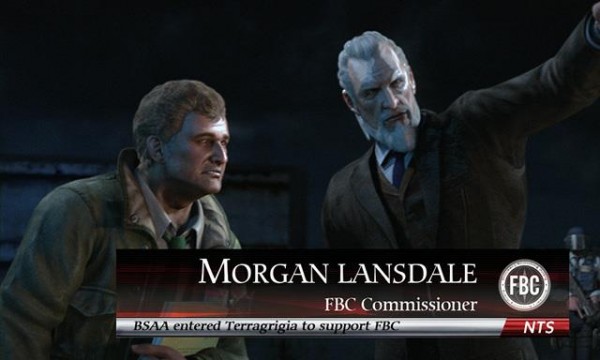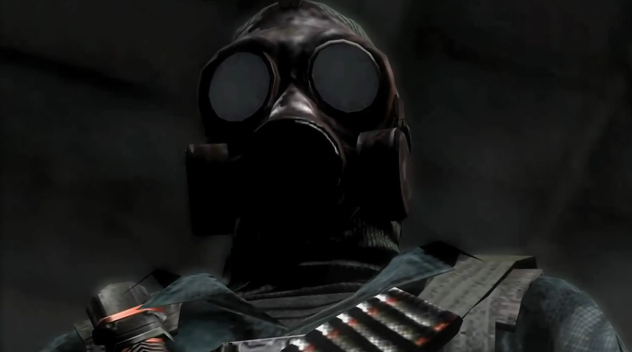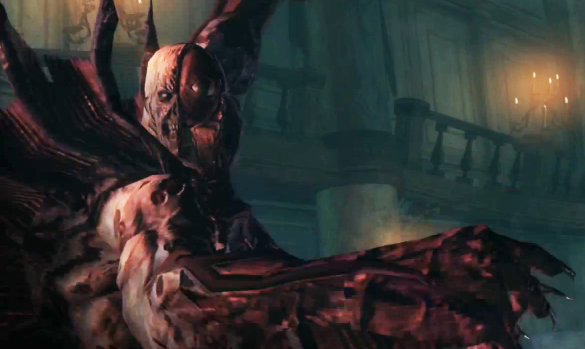|

Here we are– the final part of our Dantean tour through Resident Evil: Revelations. Having previously explored the first eight chapters in Parts I and II, there’s just four more left to go now. It seems like an age since we left the entrance to Hell behind, but the end of our journey is finally in sight. We’ve made it to the centre of the Earth, the bad guys are about to get their just desserts, and Satan himself even makes an appearance, so hang tight, readers– we’re almost there.
Chapter 9:
But if my words be seed that may bear fruit
Of infamy to the traitor whom I know gnaw,
Speaking and weeping shalt thou see.
~ Canto XXXIII
These words are spoken by Count Ugolino, the worst of the worst when it comes to political traitors, and the unfortunate man he’s nibbling on is an archbishop named Ruggieri. With only one more canto left until Satan, Ugolino is Dante’s final representation of human sinfulness, and he recounts the act of treason that led to the count’s downfall. Once part of an ancient Ghibelline family (remember them from Part I?), he switched allegiances to the Guelphs and eventually became the political leader of Pisa. But if one betrayal wasn’t enough, he also gave up some Pisan castles to rival towns (causing a rift between him and his fellow Guelphs), and began scheming with the Pisan Ghibelline leader, Ruggieri, to drive his Guelph grandson from the city so Ugolino could take advantage of Ruggieri’s fortune.
But this serial traitor was then himself betrayed when Ruggieri exposed his treachery to the public and had him and his children thrown into jail. They were held there for eight months until it was decided to nail the door shut and throw away the key, leaving Ugolino and his descendents to starve. One by one his sons and grandsons died from hunger, but eventually Ugolino’s hunger proved a greater power than his grief. It’s a pitiful tale, but that’s precisely what Ugolino’s aiming for. Unconcerned about trying to redeem himself, all he cares about is winning Dante’s sympathy and defaming his rival. Sound familiar?

Ruggieri and Ugolino in the flesh (or… pixels).
Ah, Lansdale, that no good double-crosser! He couldn’t have been a better reincarnation of Ugolino if he tried! Despite his best efforts to neutralise all threats to his plan, Jill and Chris finally discover that Lansdale was the architect behind the Terragrigia attacks all along in this chapter, siding with Veltro behind the scenes to secretly cultivate the t-Abyss virus. Terragrigia acts as his very own Pisan castle, and the subsequent rift created between him and O’Brian, as well as his own agents, couldn’t be closer to Ugolino’s exploits. But Lansdale’s treachery perhaps goes even further than Ugolino’s, as he also betrays both Veltro and his own researchers in his efforts to refine the t-Abyss virus. He fires the Regia Solis at Veltro when they’re no longer useful to him, and he unleashes a similar fate on his unsuspecting scientists when he releases the infected B.O.Ws of the Queen Zenobia and Semiramis to destroy any remaining survivors. Ugolino may be deliberately tugging at our heartstrings with his tale of eating his own children, but Lansdale’s so monstrous that we even begin to feel sorry for Veltro– and that’s saying something.
Yet Lansdale isn’t the only one who’s being alluded to here. “But O’Brian’s a good guy!” I hear you cry. “How can he be Ruggieri?” Well, let’s not forget that this entire game is based around O’Brian’s attempt to defame Lansdale and prove his connection with Veltro. Veltro’s leader Norman may also be a good fit for Ruggieri, but as Jackass and Grinder soon realise, O’Brian has led our entire team of characters on a wild goose chase, all so he can have the satisfaction of landing Lansdale in the slammer. His lies prove that he too is just as devious an architect of deception as Lansdale, and if it weren’t all in the name of peace and justice it might easily be one of the biggest betrayals in B.S.A.A history.
Chapter 10:
Because two natures never front to front
Has he transmuted, so that both the forms
To interchange the matter ready were.
~ Canto XXV
And we’re back to Canto XXV, the inspiration behind the Sea Creeper ooze and the game’s dual plots (which we explored in Part II). Once again Dante’s talking about Agnello and his band of friends, although Agnello has long since scarpered by this point. Instead we have one of his remaining friends who’s standing stock-still, gazing down at a snake who’s just bitten him in the chest. As they stare at each other, Dante describes how smoke begins to pour from the man’s wound and the serpent’s jaw until both streams of gas start to mingle with each other. But unlike Agnello, their transformation doesn’t involve any kind of weird rape or brute force– they simply transform from man to snake independently in this plume of smoke. “One rose up and the other fell down”, Dante says later, and once the metamorphosis is complete, the newly formed snake disappears and scuttles away just like Agnello did a few lines earlier.
 Enter Jessica– B.S.A.A agent turned Lansdale’s spy. Just like Lansdale’s kinship with Ugolino, our double-agent fits into Dante’s idea of metamorphosis perfectly. We even have a similar kind of stand-off, with Parker and Raymond pulling their guns on Jessica as they try to stop her from activating the ship’s self-destruct protocol. But no matter how much Parker wants to believe in her, the inevitable happens and Jessica transforms from jilted partner into devious mole as she betrays him, shoots him and destroys the Queen Semiramis all in the blink of an eye. She even slithers away into the darkness once the deed is done, never to be seen again until the very end of the game.
Enter Jessica– B.S.A.A agent turned Lansdale’s spy. Just like Lansdale’s kinship with Ugolino, our double-agent fits into Dante’s idea of metamorphosis perfectly. We even have a similar kind of stand-off, with Parker and Raymond pulling their guns on Jessica as they try to stop her from activating the ship’s self-destruct protocol. But no matter how much Parker wants to believe in her, the inevitable happens and Jessica transforms from jilted partner into devious mole as she betrays him, shoots him and destroys the Queen Semiramis all in the blink of an eye. She even slithers away into the darkness once the deed is done, never to be seen again until the very end of the game.
But there’s a little more to all this smoke and mirrors, as Jessica’s gun-toting betrayal also echoes the scene a little earlier where she shot Raymond in the casino. A proverbial snake-bite if ever there was one, we soon find out that Raymond’s been undergoing his own kind of transformation as well. He too has been working for someone else– not Veltro, not O’Brian, not Lansdale, but someone else entirely who’s never named within the course of the game. In fact, Jessica’s been working for this mystery man too, and the post-credits scene reveals Raymond handing Jessica a flask of stolen t-Abyss virus, making both of them the ultimate thieving fraudsters.
Chapter 11:
For who repents not cannot be absolved,
Nor can one both repent and will at once,
Because of contradiction which consents not.
~ Canto XXVII
A conversation within a conversation, these words are spoken by an angel to Guido da Montefeltro (who’s in turn relating his story to Dante), and the angel’s words refer to Guido’s so-called retirement into religious life. For Guido was once, you guessed it, a prominent Ghibelline leader who won several victories over the Guelph’s papal forces in the 1270s and 1280s. He was even excommunicated at one point, but was later welcomed back into the church as part of a plot to remove him from power. He realised that keeping his mouth shut was preferable to a shortened career, so he accepted the Pope’s bribe of redemption and retreated from politics to a life of piety. But as the angel above warns him, true absolution cannot come without proper repentance, and entering the Franciscan brotherhood will mean nothing if his intentions are false. But Guido failed to heed the angel’s words, and as a result both he and Pope Boniface VIII were condemned to the eighth circle of hell.
In Revelations, despite the fight with Malacoda’s head taking up a large proportion of this chapter, there are several other redemptions going on elsewhere. Parker saves a wounded Raymond back in Terragrigia, who then returns the favour at the end of the chapter, and we also have O’Brian confessing his plot to Chris and Jill. But while the latter is swiftly forgiven– it’s for the greater good, after all (and you can never be too careful when there are Jessica-shaped moles snooping about)– Raymond’s path to absolution is a little more complicated.

When it comes to black and white bad guys, Raymond’s actions are very much on the grey side of things.
As I mentioned just a moment ago, Raymond’s also not quite what he seems. Despite setting up the entire Veltro revival act with O’Brian to take down Lansdale, and not to mention paying back his debt to Parker, Raymond’s actually a lot more like Guido than we might realise. He tells Parker that Jessica managed to escape the burning ship, but when they’re both working for the same shady company, it’s a lot more likely that he actually let her escape than lose her in the confusion. Likewise, when Jessica asks him why he even bothered saving Parker in the first place during the post-credits scene, he simply states that “he had his reasons”. I’m sure Guido had his reasons for stepping down from politics too, but when it’s likely that Raymond’s going to betray Parker once again in the near future– being on opposite sides of the fight against bio-terrorism and all– will his “reasons” ever really matter in the long run? He may have gotten away with it for now, but just like Guido, there might just be hell to pay in the future.
Chapter 12:
But night is reascending, and ’tis time
That we depart, for we have seen the whole.
~ Canto XXXIV
And thus we come to the end of our Inferno journey. Chris and Jill have dived down to the depths of the sunken Queen Dido, given Norman a one-way ticket back to Hell, and retrieved the evidence they need to put Lansdale behind bars. The storm is over, a new dawn is breaking, and they’ve finally seen the whole thing through… right?
Interestingly, this quote isn’t quite as final as it suggests. Occurring just before the halfway mark of Canto XXXIV, Virgil has just pointed out Judas Iscariot being eaten by Satan, along with Brutus and Cassius wriggling and writhing in eternal pain beside him. They’re still right in the heart of the ninth circle in Satan’s lair itself, and they’ve still got some way to go before they finish their journey.

Norman’s Ultimate Abyss forms also shares many similarities with Dante’s depiction of Satan, from the six leathery wings to the three heads in one, including a vermilion one in the centre.
First, they must descend the rest of the way down Satan’s shaggy pelt, but as Dante clings to Virgil’s neck, he almost thinks they’re heading back into Hell when Virgil suddenly turns and starts climbing upwards. It’s actually due to the change in gravity (Satan is lodged in the centre of the earth, held in place by the converging gravity fields, so in order to keep “descending” to the other side of the world, Virgil must essentially climb “up” Satan’s legs), but it perhaps also signals what lies in wait for Chris and Jill in Resident Evil 5, and this is emphasised all the more when we see them return to the Spencer Estate in the credits.
Even when they finally reach a small fissure in the rock, Virgil doesn’t allow Dante much time to catch his breath, suggesting that the calm before the next storm Jill speaks of won’t last very long at all. “The way is long and the road is cruel,” Virgil says, and he urges Dante to get back on his feet so they can make a start through this last cave where the ground is rough and the light is weak. Time is moving on, and just as Dante still has Mount Purgatory to climb, so Chris and Jill have their own battles to face, reinforcing that the world of Resident Evil is far from over. We may have put this particular Hell behind us, but who knows when we’ll be pulled back down into another…
And so our odyssey into Dante’s Inferno and Resident Evil: Revelations comes to a close. I’m certainly no Virgil, but I hope this three-part series has been an enlightening read for you– it’s certainly been one for me, as it’s not only given me an excuse to play through this thoroughly excellent game again, but also a chance to brush up on my Dante, a lot of which I had long since forgotten. But as much as I love shooting zombies and waxing lyrical on its literary significance, I think that’s probably quite enough Dante for the time being (unless you want more, of course!). Next time on Another Castle, I’ll be looking at something a little lighter– I promise! But until then, readers, I bid you adieu.




 ShareThis
ShareThis







